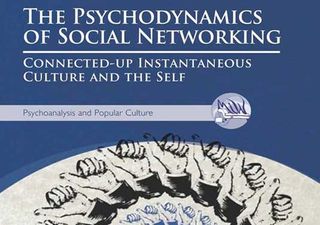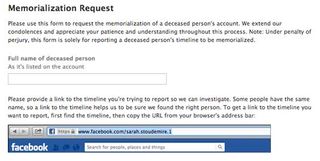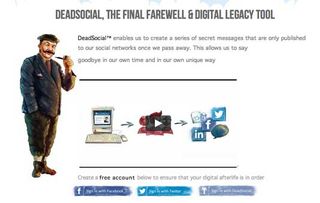What happens to your Facebook content once you're dead?
As the social media giant celebrates its 10th birthday, Katie Moffat asks if we need to make a 'digital will' to protect our content after we die.

Stop for a second and contemplate the digital footprints that you're scattering all over the web. All those tweets, Facebook updates, filtered photos and six-second videos, for better or worse, they're building a map of your life, albeit it a curated one.
For many people the collection of content they're producing is hugely important, it matters to them because it is about them, their friends, their families, highs and lows, travels and key life events. But if our digital selves are important shouldn't we have a better plan for what will happen to all that content when our real lives stop?
Tiny pieces of yourself
If you were to meet with an unexpected end tomorrow what happens to all your online content, all those tiny pieces of yourself that you've spread all over the web? For loved ones left behind, being able to have and explore that digital legacy may be extremely comforting but it's not a given that they'd be able to get their hands on it. For while we've all enthusiastically embraced the production of digital content, our preparation for what happens to it when we're no longer here is not, for most of us, something for which we've planned.
Of course in theory, if you have a Twitter or Instagram account or Facebook profile, when you cease to be, friends and family would still be able to view the associated content. But they would not be able to gain access to the accounts and as a result, there may well be issues with downloading and keeping some, or all, of it.
And while it's likely the established platforms are here to stay, given that we're only essentially in the toddler years of the internet, who knows what it will happen in years to come? If a platform disappears, all too often the profiles and content go with it.
Psychological timebomb

Psychotherapist Dr Aaron Balick, author of The Psychodynamics of Social Networking agrees that the issues surrounding digital legacy have important implications: "Anything left behind by someone who has passed away can have strong psychological significance particularly when unexpected material is chanced upon that leave the survivors feeling like there were aspects of their lost loved one that they didn't know or understand.
"There is also the nature of what is private and what is public, akin to finding and reading a personal diary, which can have negative consequences. Alternatively, what is left behind may be a 'piece of someone' that enables the mourning process to proceed more smoothly. It is totally dependent on the materials left behind and the nature of the relationship the dead individual had with the surviving ones."
Dr Balick also acknowledges that digital legacy isn't currently something most of us consider. "More and more people are realising that their digital legacy has importance after their death, but it seems that unlike making wills, which people are also reluctant to do, the vast majority of people are not considering their digital legacy. The process of mourning is a process of letting go. By taking responsibility for your digital legacy, as you would your estate, you care for the loved ones you've left behind."
Planning ahead

There are some individuals, however, who have given this thought, Christian Payne, a blogger and photographer known online under his moniker Documentally, has made careful provisions to ensure both that his loved ones will have access to his social network accounts and that other online spaces, such as his blogs, will be continuously hosted. He also regularly backs up all his social accounts so as not to rely on the platforms themselves as the sole repository for his content.
Payne is a prolific user of social networks and over the last few years has posted thousands of photos and hundreds of hours of video and audio to his social network accounts. He is acutely aware of the potential value of this content to his friends and family and has a desire to ensure its preservation after he's gone. "Some conversations are no different to conversations you have in the street," he says, "and so it's OK for them to dissolve and not be archived. But there is a lot of value in many of our interactions and the things we say and do online being available in the future."
Facebook's policies

Larger social platforms, like Facebook do have policies for dealing with the profiles of deceased users, but it's not the case that family members can gain access to an account.
A Facebook spokesperson clarified the situation to us: "When a person with a Facebook profile passes away, their relatives can memorialise their account to create a lasting online tribute. There is a delicate balance between enabling families to grieve and share memories while maintaining the expectations of privacy people on Facebook accept when they sign up to the service. For that reason, we do not provide families with access to an individual's private Facebook account."
Of course some of the smaller, less well established platforms don't have these kinds of procedures in place and what happens when family members request access to the accounts of deceased relatives can be less clear.
No easy answers

In essence there are no easy answers to questions that previous generations simply didn't have to consider and that current society seems not yet to have satisfactorily addressed, but if you think even some of your digital self is worth saving, it makes sense to give some thought to what steps you can take to ensure it happens.
Oh and if you want to carry on talking even after you're dead, a service like DeadSoci.al will send messages you've written to your friends, via your social networks, after you've gone. Seems that online we can all live forever.
Words: Katie Moffat
Katie Moffat is an independent consultant with over 15 years experience working in the communications & digital industries. Follow her on Twitter @katiemoffat.
Liked this? Read these!
- The designer's guide to working from home
- Free graphic design software available to you right now!
- Discover what's next for Augmented Reality
Have you done anything to protect your social media content long term? Let us know in the comments!

Thank you for reading 5 articles this month* Join now for unlimited access
Enjoy your first month for just £1 / $1 / €1
*Read 5 free articles per month without a subscription

Join now for unlimited access
Try first month for just £1 / $1 / €1
Get the Creative Bloq Newsletter
Daily design news, reviews, how-tos and more, as picked by the editors.
The Creative Bloq team is made up of a group of design fans, and has changed and evolved since Creative Bloq began back in 2012. The current website team consists of eight full-time members of staff: Editor Georgia Coggan, Deputy Editor Rosie Hilder, Ecommerce Editor Beren Neale, Senior News Editor Daniel Piper, Editor, Digital Art and 3D Ian Dean, Tech Reviews Editor Erlingur Einarsson, Ecommerce Writer Beth Nicholls and Staff Writer Natalie Fear, as well as a roster of freelancers from around the world. The ImagineFX magazine team also pitch in, ensuring that content from leading digital art publication ImagineFX is represented on Creative Bloq.
